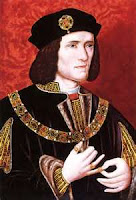A Long Time Coming
With apologies to my readers, it has been a long time: one year, to be exact, since my last posting. I have been busy, mind you. My Italian publisher Newton Compton Roma contracted another book, as second in a new series featuring investigative reporter Jake Fleming, who, in my prior book, Il Libro Segreto di Shakespeare, discovered evidence pointing to another author of the Shakespeare Canon (and no, it was not Edward de Vere, the 17th Earl of Oxford). I am still seeking an English language publisher, which is a unique situation to be in indeed, given that this book has been published (under my pseudonym John Underwood) in seven languages, to date. The last time this has happened was For Whom the Bell Tolls, by Ernest Hemmingway. Not that I am claiming peerhood with Hemmingway, but that is a fact.
Meanwhile, a true hero of mine (granted, I am a professional iconoclast) has resurfaced, literally, and I consider this very good news indeed. Richard of York, the last of the Plantagenets, has been found. Or rather, his remains have been found, and their identity has been confirmed. Complete with scoliosis (but hardly the demonic hunchback of Shakespearean lore, which is important).
Back in the 1950s, an English author with the pen name Josephine Tey wrote a work of fiction that was more factually accurate than a lot of what passes for history, titled "The Daughter of Time." Only 190 pages in length, Tey brilliantly outlined a case, using readily available documents, exonerating Richard III as the worst villain of all time, at least in terms of English royalty. Tey's fictional hero is a police detective who is stuck in a hospital room recovering from a gunshot wound, fed up with pulp fiction and crossword puzzles and basically bored to death. Finally one of his friends brings him a book of portraits from the National Gallery, including the one posted above. The cop studies this portrait for a long time, shakes his head, and asks his colleague who it is. When told it was Richard III he can't believe it. The eyes have it, he says. I am a detective, and I can see truth in a man's eyes. And this man's eyes show pain, wisdom, and knowledge. He is not evil. He is good. And he has suffered grave injustice, which is about to get a whole lot worse (namely, his murder by a distant relative who invades England from France and kills him: Henry Tudor. This first of the line of Tudor kinds, upon stealing the crown off the dead Richard's head, names himself Henry VII, who will later create the Star Chamber and invent judicial murder, among his other bloodthirsty accomplishments.
So have a look for yourself. Ponder this face. Shakespeare (or rather, the true Author) can be forgiven for getting it wrong. He was just going along with the history as written--by the Tudor usurpers, coincidentally--and set forth as gospel by the "sainted" Thomas More, which has become standard history ever since.
Even as our own history is being rewritten to glorify slavery, revise the Constitution to satisfy today's Tea Party zealots, and pretend that there is no separation between church and state, sometimes the truth will out eventually. The full saying, from Sir Francis Bacon (another controversial figure worthy of future further scrutiny) is "Truth is the daughter of time." One can only hope. Meanwhile, I highly recommend Tey's book, which the late Anthony Boucher, book editor of the New York Times, called "the greatest mystery ever written." Hardly faint praise, but there it is.



Comments
Post a Comment